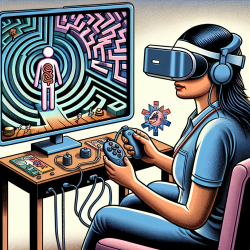Introduction
In the ever-evolving field of speech-language pathology and therapy services, leveraging technology to enhance treatment outcomes is crucial. One such promising technology is Virtual Reality (VR), which is making significant strides in managing disorders such as Irritable Bowel Syndrome (IBS). A recent study titled "The Role of Virtual Reality in the Management of Irritable Bowel Syndrome" explores how VR-based Cognitive Behavioral Therapy (CBT) can be a game-changer in treating IBS. This blog delves into the study's findings and how practitioners can enhance their skills by implementing these insights.
The Promise of VR in IBS Management
IBS is a disorder characterized by chronic abdominal pain and altered bowel habits, significantly impacting the quality of life. Traditional therapies often fall short, necessitating novel approaches like VR-based CBT. The study highlights that VR can deliver standardized CBT programs, offering a scalable solution for managing IBS symptoms. By immersing patients in a virtual environment, VR can modify cognitive processes, reduce visceral anxiety, and improve the gut-brain axis interaction, leading to symptom relief.
Implementing VR-Based CBT: A Practitioner’s Guide
For practitioners looking to incorporate VR-based CBT into their therapeutic arsenal, understanding the program's structure and benefits is essential. The VR program developed by the Cedars-Sinai team is an 8-week, home-based intervention that includes key CBT components:
- Psychoeducation: Patients learn about the gut-brain connection through immersive experiences.
- Relaxation Strategies: Techniques like biofeedback and hypnotherapy are employed in calming virtual environments.
- Cognitive Restructuring: Patients are taught to challenge and restructure maladaptive thoughts contributing to IBS symptoms.
- Problem-Solving Skills: The program encourages patients to apply CBT principles to real-life scenarios.
- Exposure Techniques: Patients practice coping strategies in simulated stressful situations.
By integrating these components, practitioners can offer a comprehensive treatment that addresses both the cognitive and emotional aspects of IBS.
Encouraging Further Research
While the initial findings are promising, the study emphasizes the need for further research to validate VR-based CBT's efficacy in IBS management. Practitioners are encouraged to participate in pilot studies and contribute to the growing body of evidence supporting VR in therapeutic settings. This involvement not only enhances their professional development but also advances the field of therapy services.
Conclusion
The integration of VR-based CBT into therapeutic practices offers a novel, effective approach to managing IBS, with the potential to improve patient outcomes significantly. By adopting this technology, practitioners can enhance their skills and provide more comprehensive care. For those interested in exploring the detailed findings of the study, the original research paper is available for further reading.
To read the original research paper, please follow this link: The Role of Virtual Reality in the Management of Irritable Bowel Syndrome.










